Fewer Malaysians expected to bother voting at state polls - why this may hurt the ruling coalition
Pollsters are also predicting lower turnout among ethnic minorities that could help the opposition PN at the Aug 12 state polls.
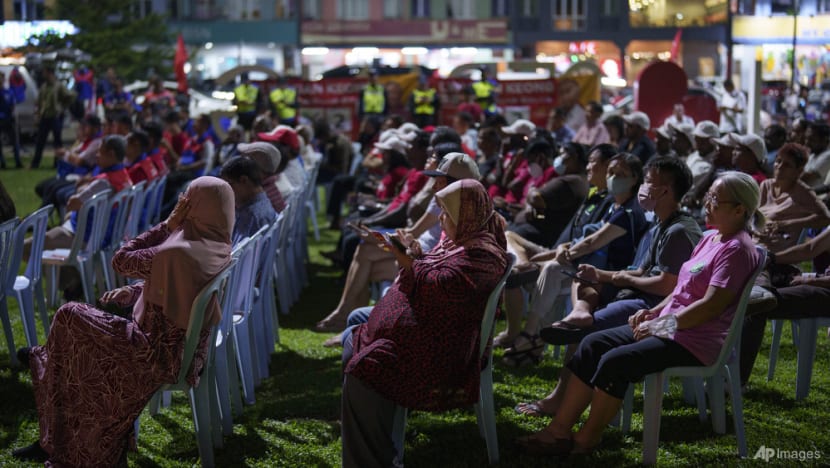
File photo of supporters of the PH-BN coalition attend an election campaign ahead of the state election in Sepang, Selangor. (Photo: AP/Vincent Thian)
ALOR SETAR, Kedah: Business owner Lim Boon Chin cuts an exasperated figure as he rants about how “a large number” of his friends and family living in other states or Singapore are choosing not to return home to vote at the upcoming state polls.
“I’ve tried persuading them, but many of them are not bothering this time. Some are unable to take leave, others are just not willing to because this is just state elections,” says the 46-year-old, who runs an automobile repair store near Alor Setar in Kedah.
His frustration stems from the tense battle for his home state of Kedah, which is among six states going to the polls on Saturday (Aug 12).
The competition between the Pakatan PH-Barisan Nasional (PH-BN) alliance and the Perikatan Nasional (PN) coalition for Kedah is expected to go to the wire, especially in seats near the west coast of the state.
The expected close contest is underlined by Prime Minister Anwar Ibrahim, who is also PH chairman, already campaigning in Kedah on two separate visits since nomination day.
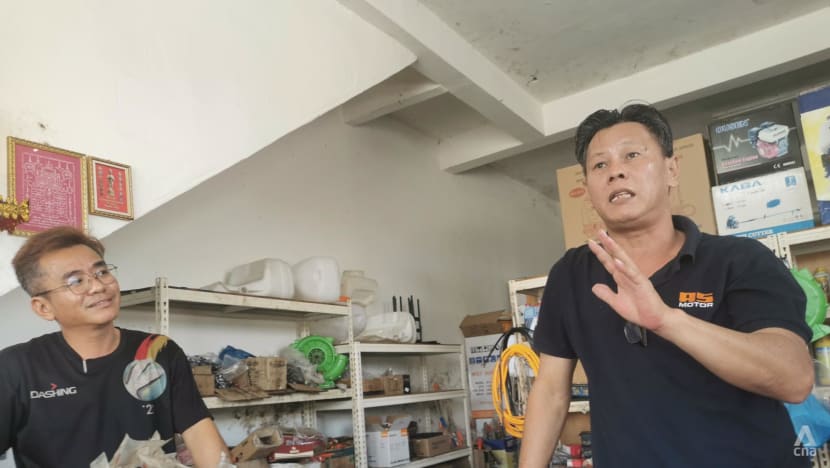
Mr Lim says he knows personally of at least eight Kedah voters who will not be casting their ballots for the state polls, having done so in the general elections last year.
“I think in Kota (Darul Aman) and for many other seats in Kedah, the contests will be close. Every vote will count,” adds Mr Lim, who is a PH supporter in the state constituency seat of Kota Darul Aman, where PH candidate and Democratic Action Party member Teh Swee Leong is defending his seat.
“If some voters do not come home to vote, especially the Chinese voters who are working and studying out of state … I fear it will be difficult for PH to defend some seats, much less wrest the state from Perikatan.”
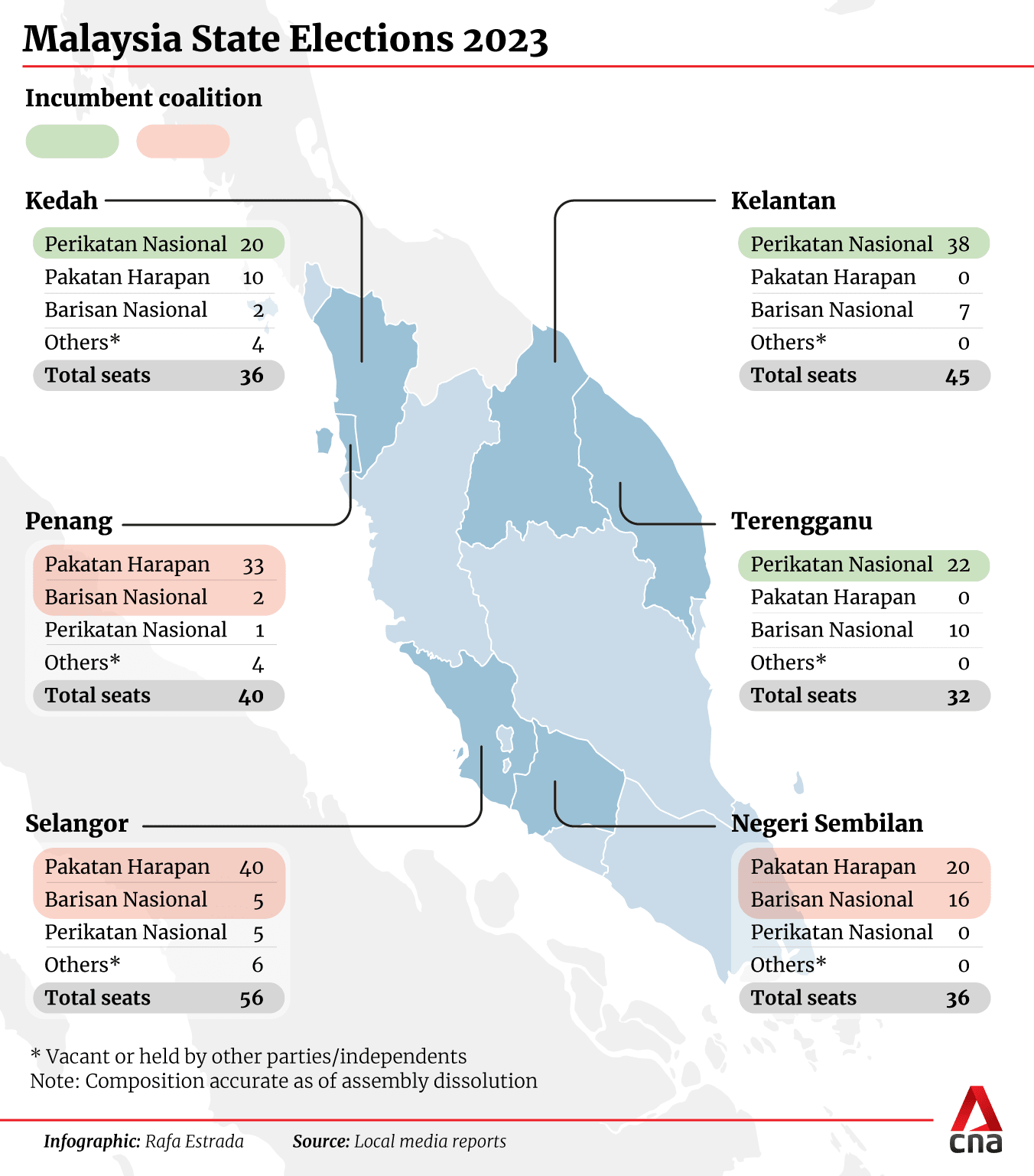
Across the six states - which also include Kelantan, Terengganu, Penang, Selangor and Negeri Sembilan - holding elections on Aug 12, analysts are predicting a lower voter turnout overall compared to the general election last November.
They cite voter fatigue, professional commitments as well as the lower stakes in the state elections as compared to the federal polls as possible reasons for some voters choosing not to cast their ballots.
Observers also project that the lower voter turnout is likely to negatively impact support for PH as many of the coalition supporters are ethnic minorities who are based away from their home state.
Related:
EARLY SIGNS OF LOWER VOTER TURNOUT
Pollsters who spoke to CNA predict that the average voter turnout for the state elections will be around 65 per cent overall, which is around a nine percentage point decrease from the general elections. The final voter turnout for the 15th general election (GE15) was 73.89 per cent.
Traditionally, state elections in Peninsular Malaysia are held at the same time as the general election. However, the six states controlled by PH and PN decided not to hold state polls at the same time as the November national polls as they said they needed to prepare for the annual monsoon floods from November to March.
On its 65 per cent turnout projection based on surveys and past data, Mr Hisommudin Bakar, executive director and founder of research firm Ilham Centre, tells CNA: “A key reason for this is that those who are working outside of state or country, or in far areas, many will not return back to vote.”
Political analyst and co-founder of pollster Merdeka Center Ibrahim Suffian shares these sentiments.
“What we are seeing is that the turnout is likely to be 10 per cent less than in GE15, maybe 65-67 per cent. In some northern states like Kedah, Kelantan and Penang, the turnout might be impacted by non-resident voters who are working overseas or in other parts of the country,” says Mr Ibrahim.
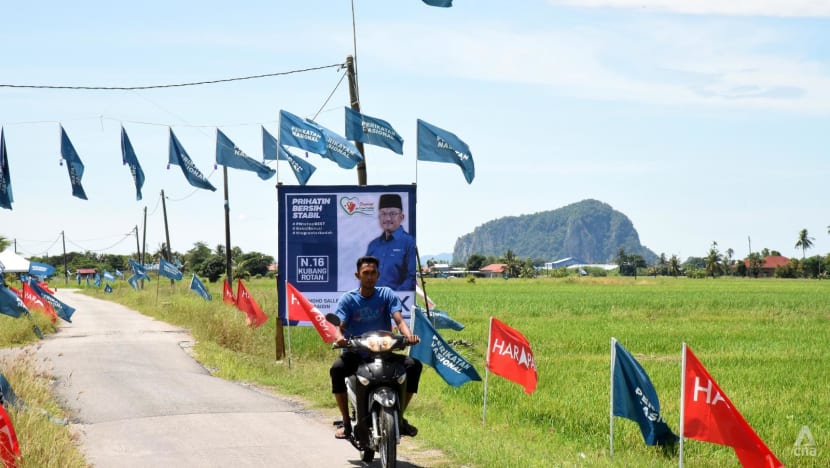
One voter who tells CNA that he will not be casting his ballot for the upcoming polls is Farizul Izwani, who is registered to vote at the state constituency of Cempaka in Kelantan
Farizul, who is based in Selangor for work, says that travelling home might be cumbersome, and he feels that it is unlikely that his vote would matter in the bigger picture.
“When I travelled back to vote in the general election, I had to endure a nine-hour traffic jam from KL to Kelantan,” says the 42-year-old.
“PAS (Parti Islam Se-Malaysia) is also very strong in Kelantan. I don’t think my vote will be enough to sway support for PH-BN,” says Mr Farizul, who is a PH supporter.
Mr Thomas Fann, chairman for non-governmental group - The Coalition for Clean and Fair Elections - which is better known as Bersih, predicts that the voter turnout is likely to be around 64 per cent based on the feedback he received.
“State elections not held in conjunction with the General Election tend to have a lower voter turnout by around 10-15 per cent. For the upcoming state polls, the early signs are not good … We are a bit concerned,” says Mr Fann.
Bersih is a strong advocate for mass participation at the polls, and has launched a #VoteLocal campaign on Aug 1 to persuade voters to cast their ballots irregardless of which party they support.
Mr Fann cites how the PH candidate Michelle Ng for the Subang Jaya state seat in Selangor recently revealed that there has been a lower number of postal ballots issued for her constituency than expected.
In the video posted on Instagram, Ms Ng says that only 398 postal ballots were issued by the Election Commission for the Subang Jaya state seat for the upcoming polls.
This is significantly lower from the projected 1,425 postal ballots issued for the area during GE15 for the Subang parliamentary seat.
“If this is reflective of the voter turnout rate on Aug 12, we are headed for disaster. In order for PH to retain the state, we need at least a 65 per cent turnout. I hope this is a wake-up call,” she says in the video.
LOWER TURNOUT AMONG ETHNIC MINORITIES LIKELY TO ADVANTAGE PN
On how this lower voter turnout could impact overall results, observers CNA spoke to outline that a large number of voters who will abstain from voting will likely be the ethnic minorities - Chinese and Indians who are based out of state.
They add that this will likely hurt the PH-BN alliance more, as the majority of ethnic minorities support the coalition.
Bersih’s Mr Fann tells CNA: “Based on our interaction and observations with overseas voters and voters out of state, the profile of this group is typically those of Chinese ethnicity, who are registered to seats near the west coast of Peninsula Malaysia.”
He adds that a lower voter turnout for these seats would probably handicap PH.
“(With lower voter turnout), I think the seats in the West Coast would probably become a lot more competitive and may be decided by a few hundred votes,” says Mr Fann.
Ilham Centre’s Mr Hisommudin also cites data from the Melaka and Johor state polls held in 2021 and 2022 respectively, as examples of how PH’s performance was adversely impacted by relatively lower turnout by the minority voters.
Based on statistics provided by the Election Commission, the turnout for the Chinese and Indians in Melaka and Johor were 68 per cent and 43 per cent respectively.
This was lower than the figures for the General Election in November, which was 72 per cent and 68 per cent for the Chinese and Indians in Melaka and Johor respectively.
“During the two state elections, the party that benefited from the lower voter turnout from the Chinese and Indians was BN,” says Mr Hisommudin.
“However in the current political context in which BN and PH are on one side and with PN on the other, the lower voter turnout will benefit PN,” he adds.
Meanwhile, Mr Hisommudin highlights that turnout for the Malay community might also be impacted for the upcoming state polls but this is likely to be more modest as compared to ethnic minorities.
He cites reasons such as more Malays being mobilised by party machinery as well as relatively less Malays who are outstation as compared to the other races.
YOUNG VOTERS A KEY DRIVER
Another group of voters that might be a key driver in the state poll results are younger voters.
Analysts say that younger voters are electorally important because many of them are new voters that do not have strong party loyalties, and are politically undecided.
Ahead of GE15 in November 2022, the voting age was lowered to 18 and this saw 5.8 million people being added to the electoral roll.
Between November 2022 and April 2023, analysts estimate that more than 400,000 younger voters have been added to the electoral roll nationally.
Ilham Centre’s Hisommudin opines that while this is a sizable number, he warns that the elections being held in August means that many students from tertiary schools are in the midst of examinations and might opt not to make the trip back home to cast their ballots.
“The time is not right as it is near the end of term for these students. Some might be preparing for examinations and will be unwilling to travel home (to vote) this Saturday,” he says.
Political analyst Professor Ahmad Martadha Mohamed, who is also deputy vice-chancellor for student affairs at Universiti Utara Malaysia, tells CNA that students at his campus were undertaking examinations.
He adds that those that wanted to go back to cast their votes needed to apply for a special permission from the administration office and might be required to take some examination papers at a later date.
However, out of around 1,400 students who are registered voters, Prof Ahmad Martadha cites that less than 70 of them have applied for the special pass.
“I think many of these younger voters are not politically engaged and may be less inclined to return,” he says.
He adds that he was uncertain how this lower voter turnout among young voters might skew voting patterns.
“From the last GE, we saw that many younger voters voted for PN. But I think based on more recent research data, youth voter support is level across the board,” he highlights.
EFFORTS UNDERWAY TO DELIVER OVERSEAS POSTAL VOTES
In spite of the predicted lower voter turnout among outstation voters, some election candidates are bullish that the final days of campaigning might encourage more to come back and cast their ballots on Saturday (Aug 12).
Mr Tan Kok Yew, the PH candidate who is defending the state seat of Derga in Kedah, tells CNA that he is confident the turnout among the Chinese population in the state will exceed that of the general elections, and that this could be key in seats where the contest is tight.
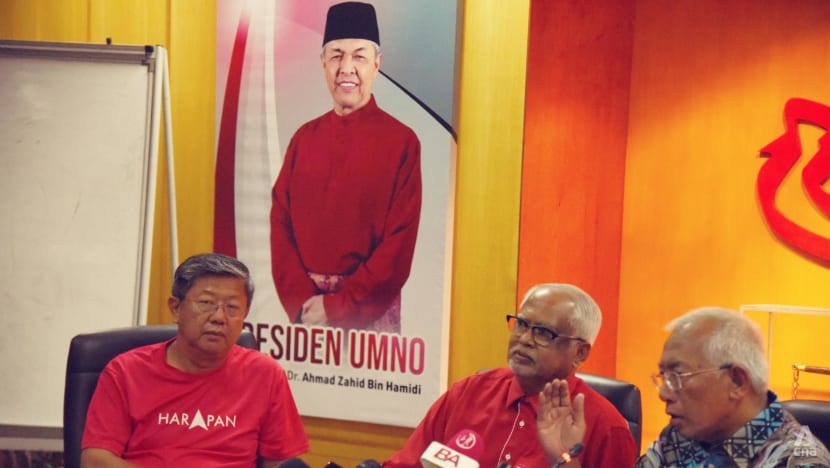
“In the last GE, the Chinese voter turnout in Kedah was around 60 per cent, lower than the national average of around 74 per cent. But I’m confident that this time, with a lot of attention on Kedah as a key battleground, the turnout from Chinese voters will be much better,” he adds.
He says his earlier worries over voter turnout have also been assuaged by reports of postal votes being delivered to Kedah.
Postal voting allows Malaysians who are based out of state or overseas to cast their ballots without having to go back physically to the polling centres.
Those interested are required to apply with the Election Commission, which will deliver an envelope containing ballot papers to the voter’s address by post after nomination day.
Voters can then mail back their ballots to the stipulated address, and they will be submitted to the respective returning officers on polling day.
The Election Commission issued around 7,900 postal ballots of Malaysians based overseas for the state elections.
In Singapore, where around 900,000 Malaysians are based for work, efforts are underway to help collate and deliver postal ballots for the state polls.
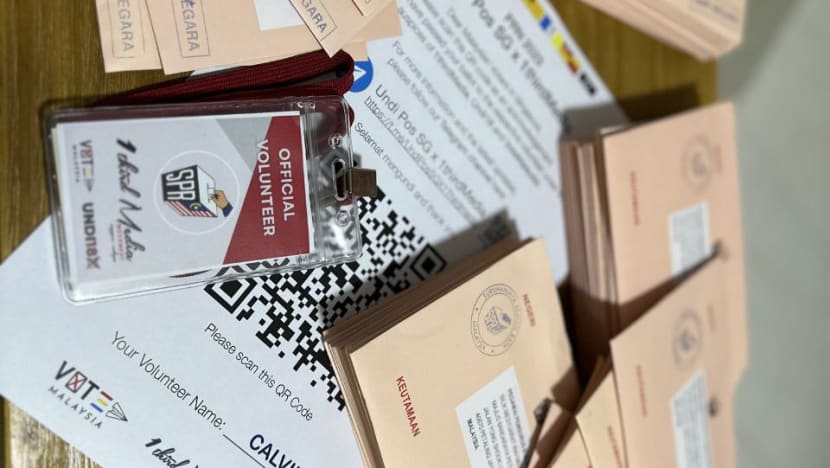
A volunteer group who is assisting with efforts is 1ThirdMedia Movement. The group encompasses 45 people who collect ballot papers from voters across ten locations across Singapore. The ballot papers will then be physically delivered to the respective polling centres.
Mr Calvin Ong, leader of 1ThirdMedia Movement, tells CNA that his team has collected 1,494 ballot papers in total.
“We are proud of this achievement because it is around 18-19 per cent of the total number of postal ballots issued for overseas voters in the upcoming state polls,” adds the 36-year-old project manager.
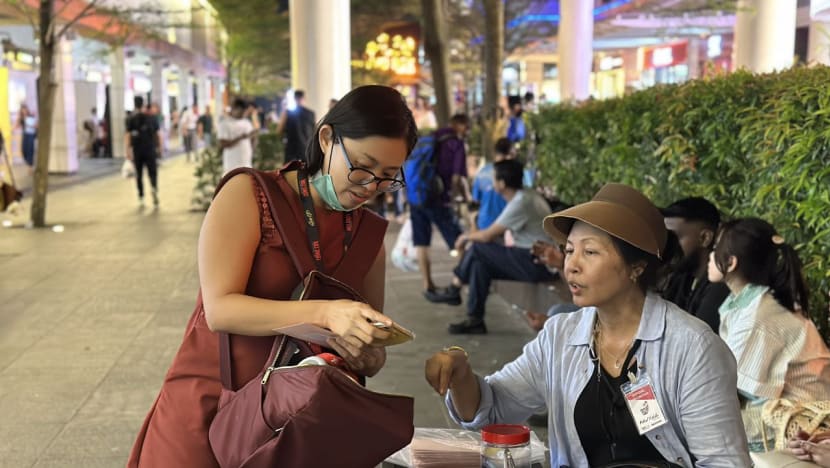
“We might be based overseas and the state elections is basically a process of electing a representative to handle local and municipal issues, but many Malaysians are still committed to cast their vote because many of our friends and family back home will be impacted directly.
“Also, I think it is very important that overseas-based Malaysians exercise their voting rights because the state governments that get elected will set the tone for how the federal government will set policy for the rest of the term.”



















